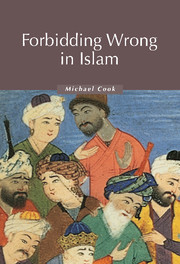Book contents
- Frontmatter
- Contents
- Preface
- Map
- 1 Introduction
- 2 The elements of the duty of forbidding wrong
- 3 How is wrong to be forbidden?
- 4 When is one unable to forbid wrong?
- 5 What about privacy?
- 6 The state as an agent of forbidding wrong
- 7 The state as an agent of wrongdoing
- 8 Is anyone against forbidding wrong?
- 9 What was forbidding wrong like in practice?
- 10 What has changed for the Sunnīs in modern times?
- 11 What has changed for the Imāmīs in modern times?
- 12 Do non-Islamic cultures have similar values?
- 13 Do we have a similar value?
- Index
4 - When is one unable to forbid wrong?
Published online by Cambridge University Press: 05 June 2012
- Frontmatter
- Contents
- Preface
- Map
- 1 Introduction
- 2 The elements of the duty of forbidding wrong
- 3 How is wrong to be forbidden?
- 4 When is one unable to forbid wrong?
- 5 What about privacy?
- 6 The state as an agent of forbidding wrong
- 7 The state as an agent of wrongdoing
- 8 Is anyone against forbidding wrong?
- 9 What was forbidding wrong like in practice?
- 10 What has changed for the Sunnīs in modern times?
- 11 What has changed for the Imāmīs in modern times?
- 12 Do non-Islamic cultures have similar values?
- 13 Do we have a similar value?
- Index
Summary
According to the Prophetic tradition about the three modes, anyone confronted with a wrong should right it with his hand if he is ‘able’; but if he ‘can't’, he defaults to his tongue, and if again he ‘can't’, to his heart. The scholars frequently talk in the same vein. This usage comes easily enough, but if we are looking for precision it may be inconveniently vague. How can we be more specific about the circumstances that render someone ‘able’ or ‘unable’ to forbid wrong?
The conditions of obligation
The question just asked brings us face to face with a standard component of the scholarly discussion of forbidding wrong that we have not so far encountered. A systematic account of the duty normally includes a schematic presentation of a set of conditions of obligation. What is involved here can best be seen in the first instance from an example. Let us take the account of the Zaydī Muʿtazilite Mānkdīm, itself based on a work of his Muʿtazilite teacher ʿAbd al-Jabbār.
Mānkdīm begins by saying that forbidding wrong has conditions (sharāʾiṭ), being obligatory only when they are satisfied. These conditions are as follows:
(1) Knowledge of law. One must know that what one commands is indeed right and what one forbids wrong. If this condition is not satisfied, one risks commanding what is wrong and forbidding what is right, which is obviously not permissible.
[…]
- Type
- Chapter
- Information
- Forbidding Wrong in IslamAn Introduction, pp. 45 - 56Publisher: Cambridge University PressPrint publication year: 2003

